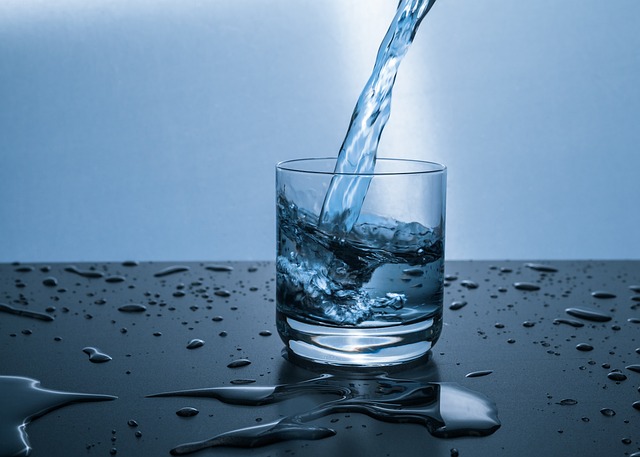We’ve all heard the saying “drink plenty of water”, but what does it really mean when it comes to overall health and fitness?
Hydration plays a major role in our general health and performance, yet many of us are still unaware of its importance. In this article, we will be examining the role of hydration in overall health and optimal fitness performance.
Introduction
Water is the single most important nutrient in our diet that helps us perform at our best. It is essential for a wide range of bodily functions and plays a fundamental role in helping us maintain proper hydration levels. Without water, our bodies are unable to carry out its regular functions. It helps us regulate our temperature, transports nutrients and oxygen throughout our body, and helps filter waste.
Proper hydration is also essential for physical performance. Even mild dehydration can lead to a decrease in physical performance and an increase in fatigue. Studies have shown that dehydration can lead to decreased energy levels, increased heart rate, and impaired cognitive skills. Proper hydration is essential for proper muscle contraction and relaxation, which is key to optimal performance.
Hydration is also important for overall wellness. Water helps our body fight off infection, helps us maintain the necessary electrolyte balance, and helps keep our skin looking healthy. Studies have shown that proper hydration can help reduce fatigue, improve cognitive performance, and reduce inflammation.
Understanding the importance of hydration and its impact on physical performance, muscle growth, cardiovascular health, and cognitive performance is essential for achieving optimal fitness, performance, and overall wellness. In the following sections, we will discuss the benefits of proper hydration, potential risks of dehydration, recommended daily intake of water, and strategies for staying hydrated.
How Much Water Do We Need?
Adequate hydration is essential for maintaining optimal fitness and wellness. However, it can be difficult to ascertain exactly how much water we need to stay properly hydrated. To understand how much water to drink on a daily basis, we must first understand the concept of water homeostasis.
Water homeostasis is the maintenance of a balance of fluids in the body. This balance is achieved by measuring the amount of water that we lose through sweat and other physical activities, and ensuring that we replace those fluids by drinking enough water. To maintain proper hydration, it is important to drink enough water to replace lost fluids, but not too much that we over hydrate.
The recommended daily intake of water can vary based on the individual. Generally speaking, a healthy adult should drink approximately two liters of water per day. This amount may increase based on physical activity levels, climate, and other individual factors. It is important to note that other beverages such as milk, coffee, tea, and juice can also contribute to your daily fluid intake.
For athletes, dehydration can be a serious concern. During physical exertion, athletes may lose up to five liters of water, depending on the intensity of the activity. This can lead to dehydration, which can have serious implications for athletic performance. A dehydrated athlete will experience symptoms such as fatigue, dizziness, and dry mouth. In addition, dehydration can lead to impaired cognitive function and decreased reaction time.
It is important for athletes to take steps to prevent dehydration. This can be achieved by drinking plenty of fluids before, during, and after physical activity. Additionally, it is important to consume electrolytes, which are substances that help regulate body hydration and aid in muscle contraction. Sports drinks and other beverages can provide electrolytes, making them a convenient way to stay hydrated during physical activity.
In conclusion, proper hydration is essential for maintaining overall fitness and wellness. Understanding the concept of water homeostasis, and knowing the recommended daily intake of water for your individual needs is essential for staying properly hydrated. Athletes should pay special attention to hydration, as dehydration can have serious implications for physical performance. By taking steps to drink enough water before, during, and after physical activity, athletes can ensure that they are hydrated and performing at their best.
Effects of Dehydration
Dehydration occurs when the body does not have the necessary amount of water to complete its normal functions. When dehydration sets in, the body’s systems begin to suffer. Unchecked, dehydration can lead to serious health complications. It’s important to stay hydrated in order to avoid potential risks associated with dehydration.
Potential consequences of dehydration vary depending on how severe it is. Generally, the effects of dehydration can be divided into short-term and long-term consequences. Short-term consequences of dehydration can include a decrease in physical performance, fatigue, dizziness, headaches, constipation, and an increase in body temperature. Long-term, dehydration can lead to more serious complications such as organ failure, urinary tract infections, and even death.
Being aware of the signs and symptoms of dehydration is key to preventing it. Common symptoms of dehydration include dry mouth, irritability, dark-colored urine, fatigue, and confusion. If you experience any of these symptoms, it is important to act quickly and replenish your body’s water supply as soon as possible.
Dehydration can have a major effect on physical performance. When the body is dehydrated, it’s unable to perform at its peak levels. Even mild dehydration can lead to decreased energy levels, reduced alertness, and reduced concentration. Furthermore, dehydration can cause the body to overheat, leading to fatigue and decreased performance.
Dehydration can have a particularly devastating effect on athletes. Even a small decrease in hydration levels can lead to significant decreases in performance, fatigue, and even decrease in muscle mass. Dehydrated athletes are also more prone to injuries such as muscle cramps, heatstroke, and other heat-related illnesses.
Dehydration can also have an effect on cognitive performance. When the body is dehydrated, it can lead to confusion, difficulty concentrating, and mental fatigue. Furthermore, dehydration can lead to slower reaction times and reduced alertness, making it potentially dangerous for drivers and other individuals who require quick reflexes.
In short, proper hydration is essential for optimal physical performance, cognitive performance, and overall health. It is important to stay aware of the signs and symptoms of dehydration and to act quickly if any are present. Furthermore, it is important to take measures to ensure that you are getting the necessary amount of fluids every day in order to stay healthy and perform at your best.
How Can We Stay Hydrated?
Staying properly hydrated is essential for optimal fitness and wellness. Here are some strategies for staying hydrated throughout the day, before physical activities, and after physical activities.
Before physical activities, it is important to pre-hydrate. Pre-hydrating helps ensure that the body is adequately hydrated, so that it can perform at its best. Pre-hydrating also helps reduce the risk of dehydration during physical activities, as it allows the body to absorb and store more water. Some pre-hydration strategies include drinking a glass of water when you first wake up, sipping water consistently throughout the day, drinking water before eating meals, and drinking a glass of water at least 30 minutes before physical activities.
After physical activities, it is important to post-hydrate. Post-hydrating helps the body replenish and restore its water levels. Post-hydrating also helps reduce the risk of dehydration and other potential side effects of over-exertion. Some post-hydration strategies include drinking water immediately after physical activities, drinking a glass of water before showering, drinking a glass of water after meals, and drinking a glass of water before going to bed.
It is also important to consume electrolytes to replace the electrolytes lost during physical activities. Electrolytes are minerals found in the body that help regulate muscle function, nerve conduction, and hydration. Some electrolyte-rich foods and drinks include coconut water, sports drinks, yogurt, and bananas.
Finally, it is important to avoid beverages that can cause dehydration. These include caffeinated beverages, alcoholic beverages, and sugary drinks.
By following these strategies, it is possible to stay properly hydrated and reap the benefits of hydration for overall fitness and wellness.
Role of Hydration in Muscle Growth
Hydration plays an important role in muscle growth and repair, as it helps to reduce fatigue and optimize performance. Adequate hydration is essential for maintaining muscle mass and strength, as it provides the body with the necessary nutrients and electrolytes that are needed for muscle repair and growth.
Water is necessary for the body to absorb proteins, vitamins, and minerals, all of which are important nutrients for muscle growth. Proper hydration can also help to reduce muscle soreness, as it helps to reduce inflammation and enhances tissue healing. In addition, adequate hydration can help to increase muscle efficiency by ensuring that electrolytes are properly balanced, thus increasing muscle endurance and strength.
When working out, it is important to ensure that you are properly hydrated to maximize muscle growth and prevent fatigue. Pre-hydrating before physical activities is important, as it helps to ensure that the body is properly hydrated and has the necessary electrolytes to sustain physical activity. During a workout, it is important to stay hydrated to help prevent dehydration and muscle cramps, which can lead to a decrease in performance and an increased risk of injury.
Post-hydrating after physical activities is also important for muscle growth. After a workout, it is important to replenish electrolytes and fluids that were lost during the workout, as this helps to reduce the risk of dehydration and muscle fatigue. Adequate hydration after a workout also helps to promote the delivery of essential nutrients to the muscles that are needed for muscle repair and growth.
Proper hydration is also important for building muscle, as it helps to increase blood flow to the muscles. Insufficient hydration can cause the body to become dehydrated, which can lead to decreased blood flow and, in turn, decreased muscle growth. Adequate hydration is also important for muscle building as it helps to keep the muscles energized and improves their performance.
In conclusion, hydration plays a key role in muscle growth and repair. Proper hydration helps to ensure that the body has the necessary electrolytes and nutrients to fuel physical activity and muscle repair. Pre-hydrating before physical activities and post-hydrating after physical activities are important for staying properly hydrated and optimizing muscle growth. Adequate hydration is also essential for increasing blood flow to the muscles and for providing them with the energy they need to function properly.
Role of Hydration in Cardiovascular Health
When it comes to overall wellbeing and fitness, hydration plays a key role in keeping our cardiovascular system in top condition. Our cardiovascular system is responsible for distributing oxygen and other nutrients to the body’s cells and tissues. Without proper hydration, our cardiovascular system can’t function optimally, which can lead to negative impacts on our physical performance and health.
Benefits of Proper Hydration for Healthy Blood Pressure:
Adequate hydration is essential for maintaining healthy blood pressure levels. When our bodies are well-hydrated, our blood vessels stay elastic, allowing for easier and more efficient blood flow. This, in turn, helps to regulate our blood pressure, making sure that it stays in the healthy range. Staying properly hydrated can also reduce the risk of developing hypertension, which is a major risk factor for heart disease.
Strategies for Keeping Hydrated During Aerobic Exercises:
Engaging in regular aerobic exercise is important for staying fit and healthy. However, when engaging in aerobic activities, it is crucial to stay properly hydrated. This is because during aerobic exercise, our bodies produce a large amount of sweat, which can cause dehydration. To stay properly hydrated, it is important to drink plenty of water before, during, and after aerobic exercise. Additionally, it is important to drink electrolyte-rich beverages, such as sports drinks, in order to replace the electrolytes that are lost through sweat.
It is also important to properly monitor our hydration levels during aerobic exercise. Paying attention to the color of our urine is a good indicator of how hydrated we are. If our urine is pale yellow, then this is a sign that we are well-hydrated. However, if our urine is dark yellow, then this is a sign that we are not drinking enough fluids and should increase our water intake.
Another important strategy for staying hydrated during aerobic exercise is to avoid drinking too much water. Overhydrating can be just as dangerous as dehydration, as it can cause electrolyte imbalances, cramping, nausea, and fatigue. It is important to stay hydrated throughout the day, and not just during exercise.
Role of Hydration in Exercise-Induced Stress:
Proper hydration is also important for helping to reduce exercise-induced stress. When our bodies are dehydrated, our heart rate and body temperature increase, creating a stressful environment for our cells and tissues. Adequate hydration helps to keep our heart rate and body temperature at normal levels, which can reduce the negative impact of exercise-induced stress.
In summary, proper hydration plays a key role in keeping our cardiovascular system and overall fitness in top condition. Staying properly hydrated can help to regulate our blood pressure, reduce the risk of developing hypertension, and reduce exercise-induced stress. It is important to drink plenty of water before, during, and after aerobic exercise, and to avoid drinking too much water. It is also important to monitor our hydration levels throughout the day and pay attention to the color of our urine. By making sure that we stay properly hydrated, we can ensure that our cardiovascular system is functioning optimally and that we are getting the most out of our fitness routine.
Role of Hydration in Cognitive Performance
The importance of proper hydration reaches far beyond physical fitness and performance. Adequately hydrating the body can also play a significant role in overall cognitive performance and mental clarity.
As with physical performance, dehydration can have a negative impact on cognitive performance. Dehydration can lead to sleep disturbances, fatigue, and difficulty with concentration and focus. As a result, cognitive performance can be reduced, leading to decreased productivity and reduced efficiency.
It is also important to note that dehydration can lead to more serious cognitive issues, such as confusion, emotional disturbances, and even hallucinations. While these symptoms are rare and usually only happen with extreme dehydration, it is still important to be aware of these potential risks.
Adequate hydration, on the other hand, can have positive effects on cognitive performance. Studies have shown that proper hydration can lead to improved cognitive functioning, including improved concentration, mental clarity, and reaction time. It can even help to boost alertness, creativity, and memory.
For individuals who are engage in activities that require a high level of concentration, such as studying, reading, or working at a desk, proper hydration is especially important. Keeping the body properly hydrated can help to promote better cognitive performance and prevent the potential issues associated with dehydration.
For those who are sedentary for extended periods of time, such as office workers, it is important to make a conscious effort to stay hydrated throughout the day. This can be accomplished by setting reminders on your phone, drinking a glass of water after each restroom break, or bringing a water bottle and having regular sips throughout the day.
Adequate hydration is essential for both physical fitness and cognitive performance. By staying properly hydrated, individuals can keep their bodies functioning optimally and reduce the potential risks of dehydration.
Conclusion
The importance of hydration for overall fitness and wellness cannot be overstated. Proper hydration is essential for physical performance, muscle growth, cardiovascular health and cognitive performance. Adequate hydration helps to reduce the risk of dehydration, which can lead to a host of health issues, including dizziness, muscle cramps, headaches, fatigue, and heat exhaustion. To ensure proper hydration, the recommended daily water intake is 3.7 liters for men and 2.7 liters for women.
In order to stay properly hydrated, it is important to pre-hydrate before physical activities and post-hydrate afterwards. During physical activities, athletes should drink small amounts of water or sports drinks regularly. Drinking too much water during strenuous exercise can cause hyponatremia, so it is important to know your own hydration needs and adjust your hydration strategy accordingly.
Adequate hydration is also important for muscle growth and repair. When the body is properly hydrated, muscle cells are better able to repair themselves and build new muscle. Dehydration can slow the process of muscle growth and repair, and can even lead to muscle loss.
Proper hydration is also important for cardiovascular health and performance. When the body is hydrated, the heart is able to pump blood more efficiently, resulting in improved heart rate and blood pressure. Dehydration can lead to an increased risk of heart attack or stroke.
Finally, hydration is essential for cognitive performance and mental clarity. Proper hydration helps to improve concentration and focus, and can even help to reduce the risk of cognitive decline. Dehydration can cause fatigue and confusion, and can even lead to more serious issues such as memory loss.
In conclusion, it is clear that hydration plays an integral role in overall fitness and wellness. By understanding the importance of hydration and the potential risks associated with dehydration, individuals can take the necessary steps to ensure that their bodies are properly hydrated. With the right strategies and a dedication to hydration, individuals can enjoy the many benefits of proper hydration and optimal fitness performance.


